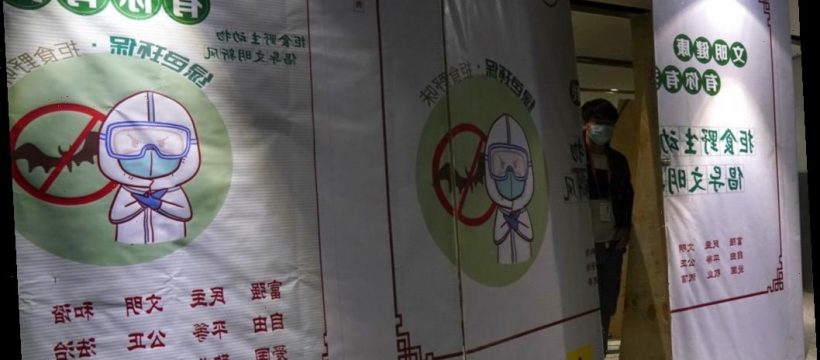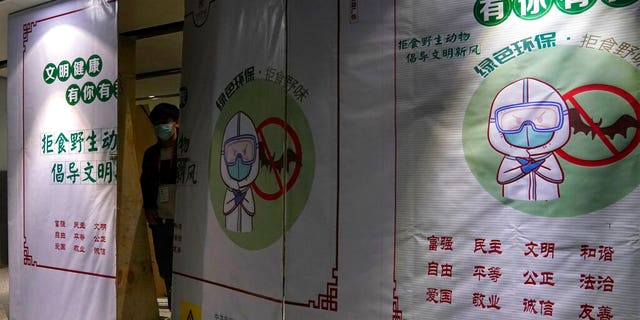Pompeo condemns China for jailing journalist who covered coronavirus outbreak in Wuhan
The Hudson Institute’s Michael Pillsbury discusses the case of Zhang Zhan, who was sentenced to four years in a Chinese prison for reporting on the outbreak.
Nearly a year to the day when the first COVID-19 cases were reported in China, Beijing is clamping down on research into the pandemic’s origins, while actively promoting fringe theories that it could have originated outside the country.
The government is distributing grant money to scientists — affiliated with the military — who are researching the virus' origins in southern China. It is also monitoring their findings and mandating that the publication of any data or research be approved by a new task force managed by China's cabinet, under direct orders from President Xi Jinping, according to a wide-ranging investigation by the Associated Press.
A worker wearing a mask peeps out behind construction barrier with a notice depicting a bat and advocating for people not to eat wild animals at the airport in Kunming in southern China’s Yunnan province on Thursday, Dec. 3, 2020.
(AP)
Consequently, very little has been made public, and authorities are severely limiting information and impeding cooperation with international scientists.
"What did they find?" asked Gregory Gray, a Duke University epidemiologist who oversees a lab in China studying the transmission of infectious diseases from animals to people. "Maybe their data were not conclusive, or maybe they suppressed the data for some political reason."
The AP’s investigation has revealed a pattern of government secrecy and top-down control that has delayed warnings about the pandemic, blocked the sharing of information with the World Health Organization and hampered early testing. Scientists familiar with China's public health system say the same practices apply to sensitive research.
"They only select people they can trust, those that they can control," said a public health expert who works with the China CDC. "Military teams and others are working hard on this, but whether it gets published all depends on the outcome."
Some Chinese scientists say little has been shared simply because nothing of significance has been discovered. Even as they controlled research within China, Chinese authorities have promoted theories that suggested the virus originated outside the country.
The government tapped scientist Bi Yuhai of the Chinese Academy of Sciences, to spearhead origins research with a $230,000 grant, records show. A paper co-authored by Bi suggested an outbreak in a Beijing market in June could have been caused by packages of contaminated frozen fish from Europe.
China's government-controlled media used the theory to suggest the original outbreak in Wuhan could have started with seafood imported from abroad — a notion international scientists reject.
The Chinese government is also limiting and controlling the search for patient zero through the re-testing of old flu samples.
Chinese hospitals collect thousands of samples from patients with flu-like symptoms every week and place them in freezers. They could easily be tested again for COVID-19, although politics could then determine whether the results are made public, said Ray Yip, the founding director of the U.S. CDC office in China.
"They'd be crazy not to do it," Yip said. "The political leadership will wait for that information to see, does this information make China look stupid or not? … If it makes China look stupid, they won't."
The Associated Press contributed to this report.
Source: Read Full Article


